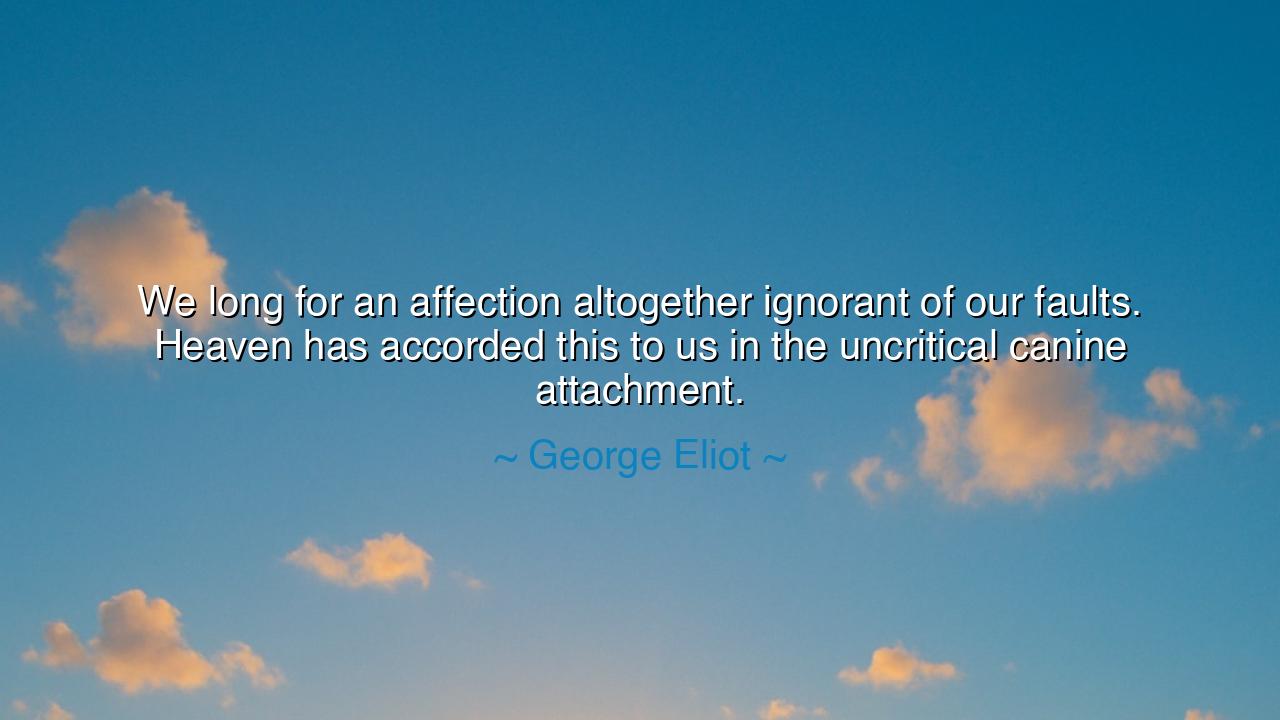
We long for an affection altogether ignorant of our faults.
We long for an affection altogether ignorant of our faults. Heaven has accorded this to us in the uncritical canine attachment.






Hear the tender and luminous words of George Eliot: “We long for an affection altogether ignorant of our faults. Heaven has accorded this to us in the uncritical canine attachment.” These words pierce to the marrow of the human condition. For what is it that mortals crave above riches, above power, above glory? It is to be loved—not for triumphs, not for virtues, not for the masks worn before the world, but to be loved in spite of flaws, in spite of failures, in spite of the shadows that dwell in every heart. And Eliot, with her clear gaze, tells us that this pure longing finds its answer in the dog, whose love is unmeasured and unjudging.
The ancients knew well that mankind is frail, wounded by pride and error. Friends may turn when betrayed, lovers may falter when disappointed, families may clash when burdened by resentment. But the dog, creature of loyalty, asks nothing of perfection. It does not count the faults of its master; it does not weigh worth upon scales of success or failure. In the wag of its tail, in the eager leap at its master’s return, the dog offers what even the noblest men struggle to give—unconditional affection.
Consider the story of Argos, the faithful hound of Odysseus. For twenty years the hero wandered, and when at last he returned in disguise, none knew him but the dog. Old, weary, and near to death, Argos alone recognized his master and wagged his tail in joy. In that moment, Odysseus wept—not for battles won, not for honors received, but for the simple, unwavering love that had endured all absence and neglect. Such is the essence of Eliot’s words: the canine attachment, blind to faults, steady through time, is a reflection of divine mercy itself.
And what does this say of us? That in truth, we are desperate for mercy. We live much of our lives striving to conceal our faults, fearing rejection, hungering for approval. Yet the dog teaches that love need not be earned by perfection. It is freely given, without judgment. In this, it mirrors what the saints and sages called grace—the love of Heaven that persists despite man’s sins. The dog, humble creature though it is, becomes a living parable of divine love.
Eliot’s wisdom is also a rebuke. For if a mere animal can give love so pure, how much more should man strive to do the same? Yet too often we bind our affection with conditions: we love if we are pleased, we love if we are honored, we love if the other is worthy. But the dog places no such chains upon its heart. If we are harsh, it forgives; if we are weak, it comforts; if we are poor, it remains. Should not humanity learn from this example, and love with a greater measure of mercy?
The lesson, then, is this: cherish the uncritical love given to you, whether by beast or by man, and seek to mirror it in your own heart. Do not withhold affection until others are flawless, for perfection will never come. Instead, love as the dog loves—steadfastly, forgivingly, joyfully. For in such love, you become not only a better companion but a truer image of the divine.
So let George Eliot’s words be written upon your heart: “We long for an affection altogether ignorant of our faults. Heaven has accorded this to us in the uncritical canine attachment.” Accept the gift with gratitude, and let it inspire you. Be patient with the faults of others. Show mercy where pride would condemn. And if ever you doubt your worth, remember that the tail that wags at your return is a sign that you are already loved beyond judgment—a whisper from Heaven itself, carried in the faithful heart of the dog.






AAdministratorAdministrator
Welcome, honored guests. Please leave a comment, we will respond soon